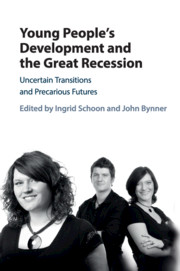Book contents
- Frontmatter
- Contents
- List of Figures
- List of Tables
- Contributors
- Acknowledgments
- Preface
- List of Abbreviations
- Part I Introduction
- Part II The Changing Context of Youth Transitions
- Part III Variations in Education and Employment Transitions during Times of Economic Hardship
- Part IV The Impact of the Great Recession on Families
- Part V Future Orientations and Well-being
- 13 Economic Recession and Youth Achievement Orientations
- 14 The Recession, Young People, and Their Relationship with the Future
- 15 The Impact of the Recession on Young People's Satisfaction with Democratic Politics
- 16 The Great Recession, Health, and Health Inequalities in Adolescents in North America, Europe, and Israel
- 17 Impact of the Great Recession on Young Adult Health: The Significance of Social Class
- Part VI Conclusion
- Index
- References
14 - The Recession, Young People, and Their Relationship with the Future
from Part V - Future Orientations and Well-being
Published online by Cambridge University Press: 20 October 2017
- Frontmatter
- Contents
- List of Figures
- List of Tables
- Contributors
- Acknowledgments
- Preface
- List of Abbreviations
- Part I Introduction
- Part II The Changing Context of Youth Transitions
- Part III Variations in Education and Employment Transitions during Times of Economic Hardship
- Part IV The Impact of the Great Recession on Families
- Part V Future Orientations and Well-being
- 13 Economic Recession and Youth Achievement Orientations
- 14 The Recession, Young People, and Their Relationship with the Future
- 15 The Impact of the Recession on Young People's Satisfaction with Democratic Politics
- 16 The Great Recession, Health, and Health Inequalities in Adolescents in North America, Europe, and Israel
- 17 Impact of the Great Recession on Young Adult Health: The Significance of Social Class
- Part VI Conclusion
- Index
- References
Summary
Abstract
Studying young people's relationship with the future enables us to explore a number of strategic issues that concern their lives and their representations of the social world, their trust in institutions, and their processes of identity construction. Moreover, given the strategic importance of the future in the construction of biographical time, reflecting on this topic gives us an opportunity to explore the current changes in youth as a life stage. In this context, this chapter sets out to understand how this relationship has been influenced by the Great Recession; in particular, whether the increase in social precariousness and the uncertainty linked to it has forced young people to redefine their aspirations and, on a more general level, influenced their capacity for agency. To do this the chapter examines the results of an international survey on youth and the future carried out in 2008, at the beginning of the recession. Second, it analyzes the results of various qualitative studies conducted between 2012 and 2014 in different European countries. The analysis carried out highlights how young people's relationship with the future during the recession differs according to the area in which they live, their position in the world of work, and their different economic, social, and cultural backgrounds. It should, however, be underlined that the bleak outlook offered by the future does not automatically translate into fatalism and resignation. By inventing new “temporal practices,” some young people are attempting to forge a positive relationship with the future, something that also translates into forms of social and political participation.
Introduction
The dramatic recession of recent years has not only accentuated young people's vulnerability in terms of the labor market and their risk of social exclusion and poverty (European Commission 2012); it has also had a direct influence on their self-representation and their capacity for agency, both of which are connected to their vision of the future. In this scenario, young people's relationships with biographical time have been profoundly reshaped, and this is especially true of their relationship with the time to come, the future, traditionally viewed as the focal point of young people's biographical narratives. The widespread condition of existential uncertainty and the advent of new forms of precariousness (Standing 2011) are indeed limiting young people's ability to view the future as a time of hope and opportunities.
- Type
- Chapter
- Information
- Young People's Development and the Great RecessionUncertain Transitions and Precarious Futures, pp. 348 - 371Publisher: Cambridge University PressPrint publication year: 2017
References
- 18
- Cited by



